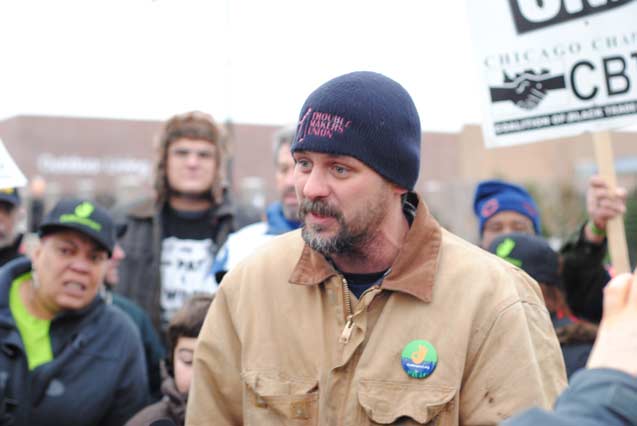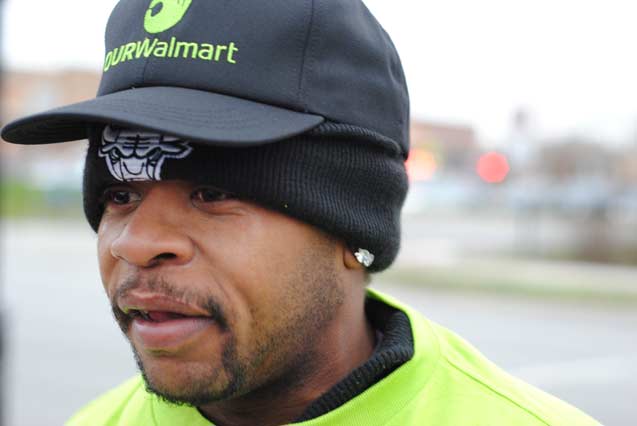
Support justice-driven, accurate and transparent news — make a quick donation to Truthout today!
A lone worker walked out of a Walmart on the South Side of Chicago while two others skipped their Thanksgiving day shifts. A group of Dallas workers walked out after working through Thanksgiving Day. Los Angeles saw associates leave the store to rally with supporters. And they aren’t alone. At least forty-six other states saw similar actions, according to the United Food and Commercial Workers (UFCW).
Despite the bitter cold in Chicago, about 200 people stood outside a Walmart early in the morning chanting: “Walmart Walmart, you’re no good, treat your workers like you should!” The protests aimed at the largest private employer in the world call on them to provide workers with a better working environment, the chance to set their hours, an end to retaliation and the freedom to organize.
The importance of the protest is not only in its numbers, but also in the opponent.
For people to have a sustainable income, “We have to change the type of jobs that are available in retail,” said Marc Goumbri, an international field organizer at UFCW. “What is going on at Walmart has to be addressed. The role that Walmart plays in the US economy is so huge that it is something that can’t be left the way it is.”
Days before Black Friday, Walmart filed an unfair labor practice suit against workers alleging that the protests were illegal. In Illinois and California, the company continued retaliations against and firings of workers attempting to organize at its warehouse.
Tyrone Robinson, the lone worker to walk out from a Chicago Walmart on the far south side of the city, estimates he earns about $15,000 a year doing produce management. One of the demands of the strikes is that workers be able to earn at least $25,000 a year if they work full time.
“My ends ain’t meeting,” he said. “My hours have gone down to about 30 hours a week, and I make $8.25.”
 Tyrone Robinson. (Photo: Mario Garcia-Baeza)
Tyrone Robinson. (Photo: Mario Garcia-Baeza)
Robinson, a small African-American man buzzing with nervous energy, was wearing his bright green OUR Walmart shirt and a Bulls cap. (OUR stands for Organization United for Respect.) Tears left a trail down his face on the chilly early morning.
“I know there are other Walmart workers in there that feel like me, but they are just terrified of retaliation because Walmart told them that if you walk off, you will be terminated immediately,” he said.
“I want to let them know if I can do it, get up and speak up about what you deserve,” Robinson said. “We work hard, we get here on time, we do what we got to do. I feel very proud to do this, and once I return I’ll tell them about it.”
Robinson lives with his grandmother in the city’s Englewood neighborhood and says he takes public transport more than an hour to get to the Walmart. The area he lives in has a 35 percent unemployment rate, and one of the highest foreclosure rates in a city hit hard by the housing crisis.
Yesterday, Robinson worked from 4 PM to 1 AM and was expected back at work at 7 AM.
About 70 protesters chanted and marched in the parking lot outside Robinson’s workplace before getting on buses to head to other Walmarts around Chicago. Each of the stores displayed the familiar Walmart logo, was located in a strip mall around an impoverished area of the city, and had workers facing the same kinds of struggles.
Yesenia Yaber is a night-shift cashier at a Walmart on the city’s northwest side. She did not show up for her Thanksgiving shift. Her main complaint, she says, is favoritism: “Other associates get what they want if they are friends or close to someone in management. If you ask for a change of day, they turn it down.”
 Yesenia and Antonia Yaber. (Photo: Mario Garcia-Baeza)
Yesenia and Antonia Yaber. (Photo: Mario Garcia-Baeza)
Yaber says she has been turned down several times for a request to switch shifts for a time that is more convenient for her to take care of her children. She relies on public housing to get by – she pays $550 for her Section 8 apartment in the city’s Little Village neighborhood. Her monthly income is $1,200.
Her mother, Antonia Yaber, said that because of her daughter’s difficult working conditions, she must take on a larger amount of child care.
“I’ve got to support her. She ain’t got enough. I always have to give her at least 200 dollars for the extra food for the kids,” said Antonia. “I’m stuck with her. I’ve got not life ’cause I’m the babysitter. She gets underpaid, so I get underpaid.”
Prior to working at Walmart, Yaber spent ten years in the Fannie Mae candy factory. Yaber says she hasn’t called in to work yet, so, “I have to come in at 1 and see what happens then.”
Most workers, including Robinson and Yaber, have said they expect some retaliation, but are not sure in what form. The majority of associates at Walmart stores are employed directly by Walmart, unlike the mostly temporary warehouse workers who have seen suspensions and firings at times only hours after an action at their workplaces.
Goumbri, with UCFW, said the company has always found ways to punish workers who “speak up for improving their working conditions and stand up for their rights.”
“But we are dealing with workers who are very determined,” he said, “and are willing to take the risk and put their livelihoods on the line for better conditions.”
Media that fights fascism
Truthout is funded almost entirely by readers — that’s why we can speak truth to power and cut against the mainstream narrative. But independent journalists at Truthout face mounting political repression under Trump.
We rely on your support to survive McCarthyist censorship. Please make a tax-deductible one-time or monthly donation.